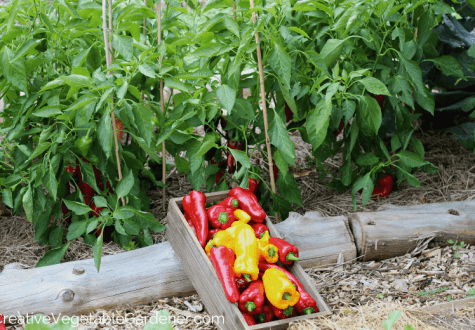Find Out the Best Fertilizers for Peppers: Top Picks for Ideal Growth
Find Out the Best Fertilizers for Peppers: Top Picks for Ideal Growth
Blog Article
Organic Vs. Synthetic Fertilizers: Which Is Best for Nurturing Healthy And Balanced Pepper Plants?
In the world of nurturing healthy and balanced pepper plants, the choice in between artificial and natural fertilizers stands as a critical decision with far-reaching implications. While both alternatives purpose to give necessary nutrients to sustain plant development, the subtleties of their effect on the dirt, plant health and wellness, and the atmosphere spark a debate that mirrors throughout the gardening community. Comprehending the unique benefits and possible pitfalls of each plant food kind is essential for pepper cultivators looking for to optimize their returns while keeping a lasting and eco-conscious approach.
Benefits of Organic Fertilizers
Organic fertilizers supply a lasting and environmentally-friendly approach to nourishing pepper plants, supplying crucial nutrients without using artificial chemicals. These natural fertilizers are derived from natural sources such as compost, manure, bone meal, and seaweed, promoting dirt health and wellness and biodiversity. Unlike synthetic fertilizers, natural choices release nutrients gradually, making sure a balanced and stable supply for pepper plants to prosper.
One considerable benefit of natural fertilizers is their capacity to improve soil framework and water retention. By improving soil health, organic plant foods promote advantageous microbial activity, which assists in nutrient uptake by pepper plants. In addition, natural fertilizers decrease the threat of chemical run-off, protecting water sources from contamination and safeguarding the atmosphere.
Additionally, natural plant foods add to long-term dirt fertility by promoting the growth of advantageous dirt organisms. These microorganisms help break down natural matter, releasing nutrients in a kind that is quickly available to pepper plants. best fertilizers for peppers. By fostering a healthy soil ecological community, organic plant foods sustain sustainable pepper cultivation methods that benefit both plants and the environment
Downsides of Synthetic Plant Foods
Artificial plant foods, in comparison to their natural counterparts, present various negative aspects when utilized to nurture pepper plants, impacting both plant wellness and environmental sustainability. One significant disadvantage of artificial fertilizers is their tendency to leach nutrients from the dirt quickly. This quick leaching can bring about nutrient discrepancies in the soil, triggering plants to experience deficiencies or toxicities. In addition, artificial fertilizers can harm beneficial soil microorganisms, such as earthworms and valuable microorganisms, interfering with the soil environment's balance.
Additionally, the overuse of artificial plant foods can add to water air pollution. Excess plant foods not taken in by plants can remove right into water bodies, causing eutrophication, where algae flowers deplete oxygen levels in the water, harming marine life. Artificial plant foods are normally acquired from non-renewable sources, such as fossil gas, contributing to carbon discharges and ecological deterioration throughout their production.
Nutrient Absorption Comparison
Efficient nutrient absorption plays a critical role in the total health and wellness and development of pepper plants. When comparing artificial and natural fertilizers in regards to nutrient absorption, organic plant foods have the advantage of giving a more well balanced and slow-release resource of nutrients (best fertilizers for peppers). Organic fertilizers consist of a range of macro and trace elements that are not only helpful for the plants but additionally promote healthy and balanced soil microbial task, which helps in nutrient uptake. On the various other hand, artificial plant foods frequently supply a quick find out release of nutrients, which can cause leaching and overflow, leading to lower nutrient absorption rates by the plants.
In addition, natural fertilizers boost soil framework and water retention capacity, allowing pepper plants to gain access to nutrients extra efficiently. This better dirt high quality promotes origin growth, allowing far better nutrient absorption. Synthetic plant foods, although initially boosting plant development due to their high nutrient focus, may impede long-lasting nutrient absorption by derogatory dirt health and wellness with time.
Ecological Impact Considerations

On the other hand, artificial plant foods, although frequently more focused and quickly available to plants, can have damaging effects on the environment otherwise applied effectively (best fertilizers for peppers). Their production requires high power inputs, causing greenhouse gas emissions and adding to climate modification. The drainage of excess artificial fertilizers can contaminate water resources, leading to eutrophication and harming aquatic environments.
Finest Fertilizer Practices for Peppers
To accomplish this, it is necessary to adhere to finest plant food practices tailored to the specific requirements of pepper plants. One crucial technique is to do a soil examination before applying any type of plant foods.
One more vital method is to fertilize pepper plants at the appropriate time. Generally, peppers profit from receiving fertilizer at growing and after that again when they start to flower. Over-fertilizing can bring about nutrition inequalities and hurt the plants, so it is vital to comply with recommended application prices.
Additionally, picking a balanced plant food with an NPK ratio that suits pepper plants' requirements is fundamental. Inevitably, integrating natural and artificial fertilizers judiciously can assist support healthy pepper plants while lessening environmental impact.
Final Thought

Organic plant foods offer an environmentally-friendly and sustainable approach to beneficial pepper plants, offering essential nutrients without the usage of artificial chemicals. Unlike synthetic fertilizers, organic choices release nutrients gradually, guaranteeing a balanced and constant supply for pepper plants to flourish.
Artificial fertilizers, in comparison to their organic counterparts, pose various disadvantages when utilized to nurture pepper plants, influencing both plant wellness and environmental sustainability. When contrasting synthetic and natural plant foods in terms of nutrient absorption, natural plant foods have the benefit of providing a more balanced and slow-release hop over to these guys resource of nutrients.Additionally, natural plant foods improve dirt framework and water retention capacity, permitting pepper plants to access nutrients more successfully.
Report this page